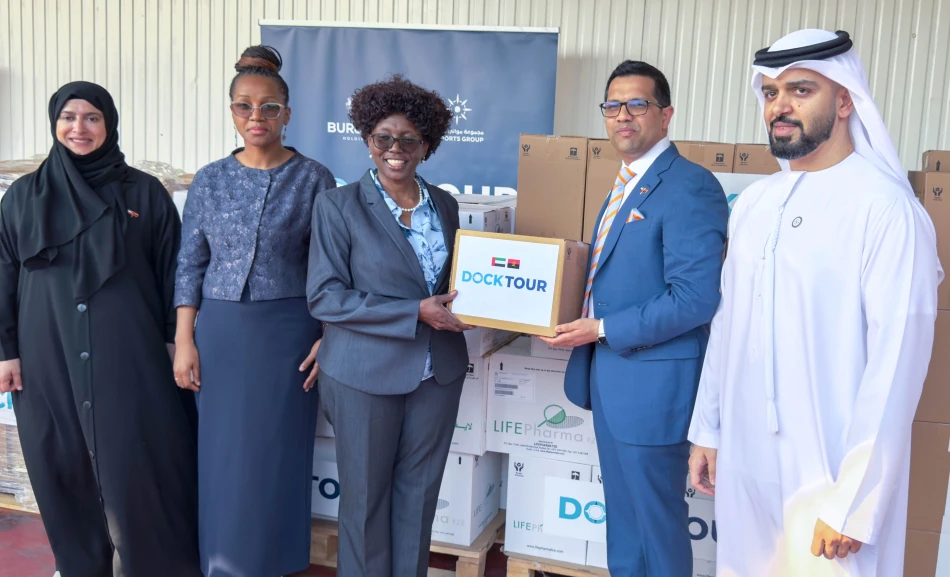
Emirati Assistance: UAE Supplies 800,000 Medical Tablets to Angola through 'Doctor' Maritime Health Project
UAE's Medical Maritime Initiative Delivers 800,000 Essential Drugs to Angola in Strategic Health Diplomacy Push
The UAE is leveraging its maritime expertise and healthcare capabilities to expand soft power influence across Africa, with Abu Dhabi Ports Group and Burjeel Holdings jointly delivering 800,000 essential pharmaceutical doses to Angola's Ministry of Health. This latest shipment under the "Doctor" maritime medical project represents a calculated move to strengthen UAE-Africa ties while addressing critical healthcare gaps in one of the continent's most resource-rich yet medically underserved nations.
Strategic Health Partnership Targets Africa's Medical Supply Chain Gaps
The formal handover ceremony in Angola brought together Health Minister Silvia Lutucuta, Abu Dhabi Ports Group Regional CEO Mohamed Aida Al Manhaali, and Burjeel Holdings Co-CEO Safir Ahmed, signaling the high-level political importance both nations place on this healthcare cooperation.
The donated medications address Angola's most pressing health challenges, including treatments for diabetes, bacterial infections, hypertension, cardiovascular disease, and gastric disorders. These conditions represent the leading causes of morbidity in sub-Saharan Africa, where chronic disease burden is rapidly increasing alongside persistent infectious disease challenges.
Maritime Logistics as Healthcare Infrastructure
The Doctor project's approach integrates logistics services, standardized infrastructure, training programs, and emergency response capabilities into a comprehensive platform. This model mirrors successful health diplomacy initiatives by other Gulf states, particularly Saudi Arabia's health sector investments across Africa and Qatar's medical outreach programs.
Unlike traditional aid models that rely on air transport for medical supplies, the UAE's maritime-focused approach leverages Abu Dhabi Ports' extensive shipping networks to create sustainable, cost-effective supply chains. This strategy could prove particularly valuable for bulk pharmaceutical deliveries to coastal African nations.
Geopolitical Calculus Behind Medical Diplomacy
Angola represents a strategic target for UAE engagement, given its position as Africa's second-largest oil producer and its growing economic ties with Gulf states. The country's healthcare system struggles with chronic underfunding and supply chain disruptions, making it receptive to external medical assistance.
The timing aligns with broader UAE efforts to diversify its African partnerships beyond traditional trade relationships. Similar to China's health-focused Belt and Road initiatives, the UAE appears to be using medical diplomacy to build long-term political and economic relationships across the continent.
Sustainable Development or Strategic Positioning?
While officials frame the initiative within UAE's sustainable development vision, the project's focus on maritime logistics suggests deeper commercial motivations. Abu Dhabi Ports has been aggressively expanding its African port operations, with investments in Egypt, Tanzania, and other coastal nations.
The healthcare angle provides political cover for broader infrastructure investments while building goodwill with African governments. This approach has proven effective for other middle powers seeking to expand their influence without the baggage associated with traditional Western aid programs.
Market Implications and Scalability Challenges
For pharmaceutical companies and healthcare investors, the UAE's model demonstrates how logistics infrastructure can be leveraged to penetrate underserved African markets. The integration of ports, healthcare delivery, and government partnerships creates potential templates for private sector engagement.
However, the sustainability of such initiatives remains questionable without local manufacturing capabilities and healthcare system strengthening. Angola's oil-dependent economy faces ongoing fiscal pressures that limit its ability to maintain consistent pharmaceutical procurement, making it dependent on external assistance.
The Doctor project's success will likely determine whether the UAE expands this model to other African nations or focuses resources on deeper engagement with current partners. Early results in Angola could influence similar initiatives by other Gulf states seeking to establish healthcare diplomacy programs across the continent.
Most Viewed News

 Sara Khaled
Sara Khaled






